How To Do Online Reputation Management

An Online Reputation Management Guide. Cheatsheet Included!
ORM is a mish-mash of many different aspects of online marketing, from SEO to social media management, along with the timeless notion of doing good business.
If you’re new to all of this, perhaps you’re a small business owner or a job-seeker looking to improve your own digital footprint, you’ll find everything you need right here.
If you’re already versed in online marketing, you’ll probably be familiar with many of the most significant aspects of ORM already, and in that case this guide will help you to connect the dots.

This guide will show you how to do ORM for:
- Individuals who want positive things to show up when somebody searches online for their name, both to benefit them professionally and in their personal lives.
- Business owners who want to make sure they’re doing everything they can to ensure that the one or two negative reviews aren’t showing up ahead of their thousands of satisfied customers.
- Since various types of digital agencies make up a large portion of our userbase at SERPWoo, I also wanted to talk about how agencies can start offering ORM as a service to clients if they aren’t already taking advantage of the opportunity.
- Anyone else who simply needs a little help keeping their search results nice and tidy.
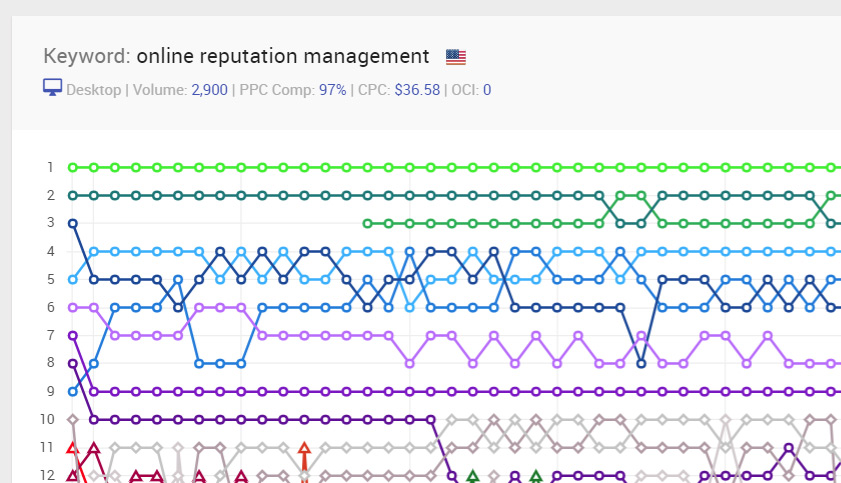
Side note: Throughout this guide, I’ll usually refer to the entity that we’re doing ORM for as “you” but if you’re reading this to help your business then replace “you”, “yourself” and “your name” with “your business name,” or if you’re an agency then it’s “your client’s name,” and so on.
In most cases, the advice is the same regardless of which group it’s applied to, but we’ll also cover the specific nuances of each one.
Before we start to offer up solutions for fixing a bad online reputation, let’s talk about the problem at hand.
THE PROBLEM
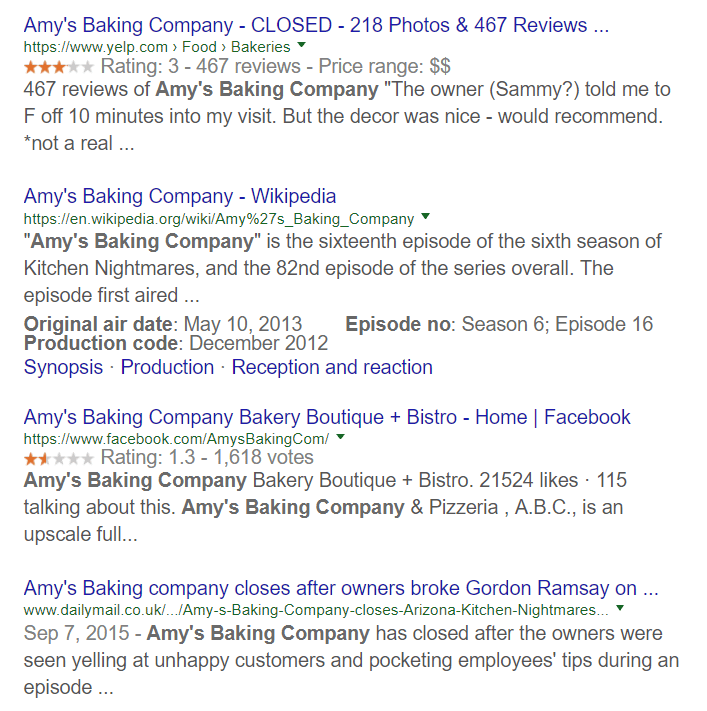
People often associate ORM with damage control after something negative has been posted about you online.
That’s a big piece of the puzzle but it’s also a pessimistic view of the search engine results pages and the power they have.
Doing this work before the negative stuff shows up is a lot better. Preventative ORM is ideal. But we don’t live in an ideal world.
You can work tirelessly to cover up negative rankings about yourself, and probably see some great results, but many people are attracted to the negative so you’re swimming against the current.
When you’re looking at reviews for a product, there could be tons of positive ones, but don’t you feel a lot more drawn to filter them by the negatives?
If there are negative things showing up when people search for you, they’re going to stick out a lot more than things like your Facebook or an old Myspace that’s still lingering in the SERPs.

Instead of simply viewing the act of ORM as trying to obfuscate negative things, think of it as a way to highlight the positives, too.
Why does the negative stuff seem so firmly rooted in the SERPs?

It comes down to the usual ranking factors in search engines along with a bit of human nature and common sense. If you’re looking at reviews, you probably want to see the negative ones.
Not because you’re drawn to darkness and negativity on some deep critique of human nature or anything like that, but simply because you want to know what could go wrong with whatever you’re looking up reviews for.
As we discussed more thoroughly in our SEO Audit Guide, the click through rate in the search results pages is a ranking factor. If not enough to move things to the top in the first place, then definitely enough to help keep them there.
When something a little more serious than a typical 2 or 3-star review is eating up space in the SERPs, like a hit piece article from a large publication, or some salacious posts from a jilted ex-lover, or even just cringey status updates from your emo phase in the early days of social media that won’t seem to go away, can you really blame people for clicking those results?
A Case of Mistaken Identity
A common problem we’ll see in the SERPs takes place when you share a name with someone else, especially if that person has a checkered past, and doubly-so if they work in the same field as you.
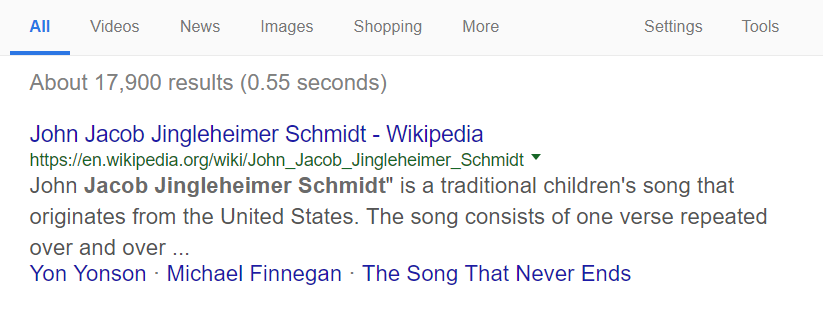
Here’s an article I wrote which details the struggle of trying to apply for jobs when you have a common name with some iffy search results. We’ll also be referencing this same article again later, as it contains a very useful list of websites that will help you fill out your search results.
You’ll have to take extra steps to differentiate yourself from them and work extra hard to grab up that real estate. If they’re a celebrity, you won’t be overtaking them but you can still focus on queries like “your name + your field of work” and “your name + your city”.
THE SOLUTION: HOW TO FIX YOUR ONLINE REPUTATION
There are a lot of different types of negative things that can rear their ugly heads in your SERPs, and different ways to deal with them.
You’ll want to target some of the negative results specifically with your efforts, and others will get cleaned up in the wash just from the rest of the efforts you’ll be taking throughout this guide and afterwards.
Online Reputation Management for Individuals
Have you ever Googled someone’s name just to see what came up?
People search for names all the time. The obvious examples are situations like when you’re applying for jobs, or when you’re on dating sites and people want to see what you’re all about.
Sometimes, you’ll just type in the names of interesting people you’ve met or heard about in your community.

Potential employees or employers might be looking you up, business partners, old friends, companies you want to work with, and the list goes on.
Whatever the reason may be, having a bad SERP can be damaging socially. In the same sense, having positive things show up can be hugely beneficial when it comes to opportunities in your personal and professional life.
Online Reputation Management for Businesses
It’s one thing for a customer to have a bad experience and to share how they think you can improve, or for somebody to mention a negative experience with you in their online journal or social media.
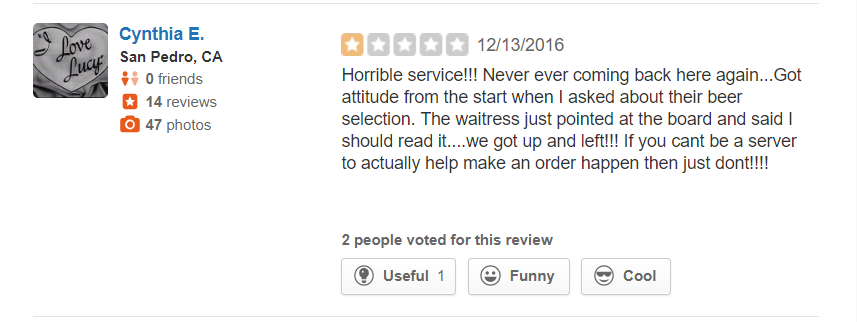
Sometimes, you slip up, and being held accountable can be a great way to improve. It’s still not ideal for these things to exist online, but at least they’re somewhat justified.
It’s another thing altogether when bad actors are actively targeting you with malicious intentions using dishonest methods.
Competition can be fierce, and not everybody is playing by the same set of rules.

There are several strategies somebody may use to defame you, from creating false reviews, submitting made-up stories to blogs, posting things online and endorsing them using fake accounts, and countless other examples.
The Good, The Bad, and the Neutral
Now, let’s look at some of the different types of pages you’ll encounter, and what you can do with them.
Media Coverage - POSITIVE or NEGATIVE
Have you done something exceptional (or controversial) that got coverage in the media at any level?
Have you gotten any attention from smaller blogs, local news stations and sites, or maybe something even bigger than that?
If there’s positive coverage of you or something you did and it’s online already, and it’s not showing up on the front page, take note of it either way because you can take steps to help it show up higher.
On the other hand, if there is negative coverage, especially on stronger platforms, this can be particularly challenging to replace compared to some of the other types of bad results we’ll be looking at.
Scam/Ripoff Sites: NEGATIVE
There are legitimate consumer advocacy sites that lend a voice for people to stand up to companies that are scamming or being misleading.
But the power of these sites is a double-edged sword that also gives a platform for competitors to take easy and cheap shots at you and to litter your SERPs with nonsense.

You have the option to respond in some cases, but if you’re arguing against someone who is lying and trying to damage your brand while posing as an innocent consumer, it’s a tough battle to win, especially on a platform that you don’t control.
Accomplishments/Volunteer Work: POSITIVE
Take note of some of your personal accomplishments throughout your life even if they haven’t gotten any publicity in the past.

If you won a contest in grade school, or were valedictorian, or volunteered to help rebuild your community after a damaging flood, travelled somewhere to lend your help, or climbed a tree to rescue a kitten, it can all be helpful in brainstorming ideas for ways to fill up your SERPs with positive content.
It’s okay to brag a little sometimes. You could create a post on Medium or any number of other sites sharing your experience about something positive you did or encountered in your life, and if it gains even a little traction on the platform, it’ll have a better chance of ranking for you, especially if you can manage to get your name in the URL, title tag, header, and so on.
Gossip Sites: NEGATIVE
Sites like TheDirty thrive by giving a platform for people to submit rumors and gossip to be seen by the masses and will often rank highly for the names of the people posted, especially locally where it’s often the most damaging.
Sports Teams & Clubs: POSITIVE
Certain sports-team management platforms for local clubs will publish the entire team roster online.
While it’s not ideal to have a schedule posted online letting people know exactly when you’re away from home for hours at a time at games, seeing that you’re a part of a team does look good in the SERPs both personally and professionally. It shows that you’re active, have interests, and can function as part of a team. The same goes for any non-athletic clubs or groups you’re a member of, especially if they have a website where you could post a short bio.
Public Records: NEGATIVE
Things like mug shots or other unflattering pieces of data that are publicly available are aggregated, scraped, and re-posted across countless sites. Before this, someone would really have to put in effort and be dedicated to find these types of things, but now it’s harder than ever to put your past behind you.

Not only that, but it might not even be you they’re finding. It could be someone else with the same name.
These are never things you want to have showing up in your search results, so let’s push these out of the way with an urgency.
Providing Testimonials: POSITIVE
Did you stay at a hotel and have a great time? Did a company you hired do a particularly great job? Did you eat the best burger of your life at restaurant?

Let them know! You can send in a testimonial and give them permission to print it, along with your name, on their website and social media.
You could also use your name to register on sites like Yelp and make it a point to participate every now and then after you have a nice experience somewhere.
Comparison Sites: NEGATIVE
Like most of the other things we’ve looked at, these can be genuine and earnest, but they can also be abused. These sites take advantage of the fact that people may be searching things like “[your brand] vs. [their brand]”, or “alternatives to [your brand]”.

It’s one thing when somebody has tried and compared both options and lays out the facts so that the consumer can make an informed decision. It’s another issue when your competitor is creating these comparisons on their own and using misleading and false information to try and paint your brand in a negative light compared to theirs, and not disclosing their relationship.
YouTube Channel: POSITIVE
Have you got some old videos kicking around on your phone? Maybe that fireworks show from 3 years ago that you haven’t watched yet?

You could create a YouTube channel using your name and upload a few videos. It doesn’t have to generate any Oscar buzz. Record some ducks, a sunset, whatever. This is an easy way to fill up some space in the SERPs.
Social Media: POSITIVE or NEGATIVE
How many times have we seen public figures get raked through the coals over old social media posts, or even seen people in our own lives who post some pretty crazy things?
If you’ve had the same Twitter account for years and years, it’s probably worth going back and looking at some of your old posts. Something that may have seemed funny or innocent at the time, or even some views you’ve reconsidered, could potentially look bad in the wrong context or to the wrong person.

You can check out the privacy settings for every social network you’ve used and adjust them to whatever you’re comfortable with, but it might be worth it to just go ahead and delete older posts in some cases.
This is an example of preventative ORM. Hiding or deleting embarrassing social media posts doesn’t mean it’s impossible to find them and that they’re wiped from the internet forever, but that’s a deeper level of digging than you’ll have to worry about in most cases, and it won’t tarnish your SERPs.
If you’re active on social media and sharing your interests, it can also be a good look and it’s an opportunity to curate how you present yourself to the world online. The big thing here is just make sure that what you’re saying online fits with the image you want to create of yourself.
Quality or Quantity?
Many people create spammy types of profiles, and low-quality content on countless platforms in the name of quantity over quality when they’re trying to flood the SERPs.

The problem there is that while you may very well be pushing the negative stuff out of the top 10 or 20, what you’re filling it with isn’t ideal to anyone who is paying attention. It’ll look very strange.
Having 10 or 20 great pieces of content showing up can be infinitely more powerful than having 1,000 pages of spam.
Content You Control vs Content You Don’t Control
Content that you control includes things like your own blog posts, your social media, profiles, and anywhere else that you can log-in and edit the page yourself, or at least can contact someone else who will do so.

There is also going to be stuff that you don’t control on platforms that you can’t edit.
Everything under your control should be a positive or neutral result, and content that you don’t control could go either way.
The positive stuff is, of course, what you want to boost and empower, and the negative stuff also needs to be dealt with.
Removing Negative Content About Yourself
An honest negative review is just something you’ve usually got to take on the chin and learn from.
In some cases, you can make things right with the unhappy customer and they’ll update their review, other times they’ve made up their mind and they don’t want to be happy, or they’re a competitor who is actively seeking to harm you.

If there’s stuff from your past on platforms that you do control, and it’s a bad look that you want to get rid of, you can simply log-in and delete it most of the time. Granted, it’ll still usually show up in the Wayback Machine, but at least it adds an extra step, and it should disappear from the search results sooner or later which is the main objective.

If someone is out for blood, they may find ammo to use against you in the Wayback, but at least purging some of your more questionable Tweets from ages ago will take care of the majority of people who might be looking into you.
You can try contacting the publishers of the websites that are hosting any libelous or otherwise negative content about you. It really comes down to what site it is, what their goals are, and what they are hosting about you. Most legitimate platforms won’t want to enable somebody to harass you, threaten you, or otherwise break the law.
When to Get the Law Involved
There are times where your best recourse will be to lawyer up, or to get law enforcement involved for particularly nasty and malicious situations.
If you are the victim of revenge porn for instance, where somebody posts explicit photos of you online without your consent, this is illegal in many places and can lead to severe criminal charges for the person who did it.
The people operating these types of sites aren’t known for their compassion, so your mileage may vary when it comes to reaching out to them to remove the offending material, meaning you’ll have to force them to do it when asking doesn’t work.
Sometimes, simply contacting the website that’s being used to host illegal, abusive, harassing, or otherwise negative things will be enough to have the offending content removed.

You may have to deal with squatters and impersonators, too. Twitter, for example, has a process for reporting an account that is impersonating you. Depending on what they’re doing, you might be able to make the case that they’re harassing you by impersonating you and report them to whichever platform they’re using.

Other times, you’ll need to take things further and involve the law by seeking professional legal help.
ONLINE REPUTATION MANAGEMENT ACTION PLAN
This action plan will take you from start to finish of getting your online reputation on point. If you don’t have anything negative showing up yet, then we’ll make sure things stay that way.
Steps 1, 2, and 3 fall under the preventative and proactive umbrella of ORM, and then we get into reactive ORM where you’re trying to fix damage that has already been done.
Step 1) Evaluate the Battlefield
Before anything else, you need to look at the SERPs for your name, brand name, or your client’s name. You’ll also want to look up product names, names of business partners, and anything else that may apply. You can do this very efficiently using SERPWoo, otherwise your web browser will also work just fine.
Try different spelling variations and get creative, our first goal here is just to get a lay of the land and to see what we’re working with. Search for your name along with any groups you’ve been associated with, or communities you’re a part of, and for things like your name and your profession or city at the same time.
Also, disable personalized search results to get a more accurate perspective.

Look through the first few pages of Google results. The first page is what matters most, some people will click through to page 2, and that should account for the vast majority of people searching for your name but it’s still a good idea to know what’s hiding out on page 3, 4, 5... especially if you’re planning to shake up these SERPs a bit, there might be some landmines in there you want to avoid, or some positive coverage that already exists for you to include in your plan.

By adding any relevant keywords like your name, brand names, and so on into SERPWoo, you’ll have a perfect view of what’s ranking and the ORM Goggle View can be used to tag each result, giving a visual representation of the state of each SERP.
If it’s all positive, you’ve got it easy. If it’s mostly negative, it’s an uphill battle. Take close note at what’s on the very front page, and what kind of first impression it gives.
Step 2) Setting up your Foundation
In this step, we’re going to make some profiles on different sites using your name (or brand name as the case may be).

If you’re doing this as an individual, start with the usual suspects and think of some popular sites that allow people to register profiles.
If you don’t have Twitter, Pinterest, or LinkedIn those are all good places to start. If you don’t have a Facebook, chances are you won’t be starting one at this point anyways. Don’t worry if nothing else comes to mind, we’ll cover that shortly.
Take some time to setup Google Alerts and to monitor your mentions on social media. If you’re using SERPWoo and you haven’t already done so, add your keywords into a new ORM project to start tracking how the SERPs behave.

You can use a variety of tools to monitor your mentions on social media and in the SERPs, from Ahrefs to webhose.io.
Step 3) Fortifying your Armor
Now it’s time to grab that list of positive results that are already appearing in search that we mentioned earlier, if you’ve got them. If they’re showing up right at the top, that’s a great start. If not, we want to massage them a little bit to see if we can put them over the edge without having to do anything too drastic.
You can schedule these pages to be shared across your various profiles, which can act as nodes for you, and help to create a wider net of positive results surrounding your name.
If you aren’t very well versed or experienced with on-page SEO, you would be wise to either take the time to learn the ropes on your own or hire somebody who can optimize your content for you.
Step 4) Go on the Attack
Now that we’ve covered the basics like setting up new profiles that could move up in the SERPs and sending some social signals to the existing positive stuff that’s out there, it’s time to start getting your name out into new places and tidying up some of the negative stuff.
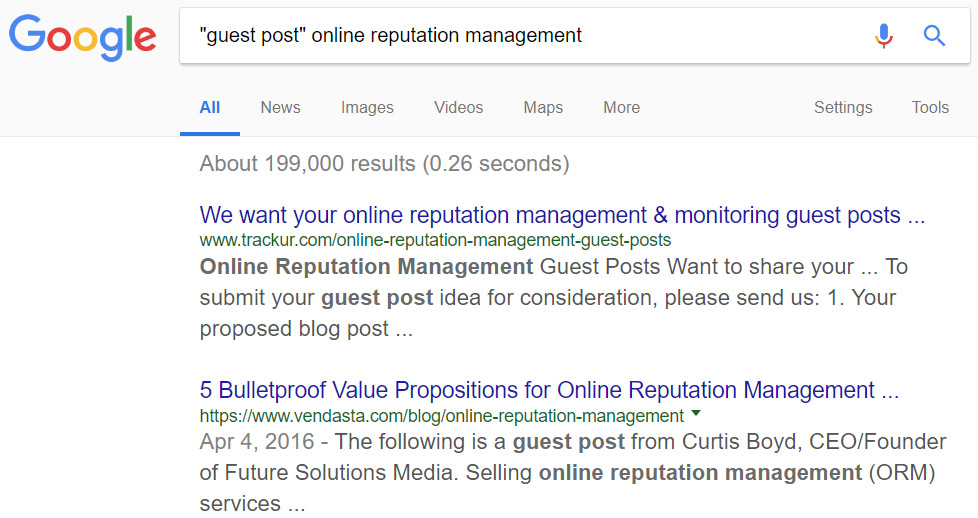
You can find websites that are accepting guest posts and create a nice piece of content to publish with your byline, and you can link to your social media profiles, maybe a project you’re working on, or another page that you’re trying to move up in the SERPs.
If you don’t feel like starting up a whole outreach campaign, especially when backlinks aren’t necessarily your goal, you can post an article to BuzzFeed right now. There are many other sites in a variety of niches and styles that can help you push down negative results, too. Here’s a list of 45 of them that we compiled in a previous post.

How much time would you be willing to spend to create 15 or 20 great posts and profiles on strong websites if it meant there was a good chance they’d fill up your first page or two of results?
Between posting them, sharing them, and taking opportunities to link between your positive results (Including linking them to your social accounts, linking out to your social accounts from your website and profile pages, and so on), it really doesn’t take much to start pumping out a lot of positive internet results for yourself, your brand, or your clients.
And of course, in some cases, you’ll just need to bite the bullet and file a cease and desist, or even something stronger than that when you are being targeted illegally.
Step 5) Tracking, Keeping Inventory, Continuing the Attack
Once the brunt of the work has been done, it’s still important to continue to monitor your SERPs.
This step is all about keeping track of the changes you’ve made, the content you’ve put out there, and seeing where it falls into place. If you’re seeing positive movements and good changes to the SERP, that’s great. But what about if things still seem stuck?

Well, at the end of the day, this is all about SEO and sometimes you’ve just got to roll up your sleeves and build some links. Be very careful with anything even remotely automated. Imagine ending up with tons of horrible spun articles filling up your best SERP real estate?
The Agency’s Perspective
This next section is specifically for digital agencies who want to offer ORM services to their existing or new clients.

Before you do anything else, make sure you’ve got your own affairs in order. I can’t stress this enough.
Your SERPs might be spotless right now, especially if you’re a newer agency, but you still need to work extra hard on preventative measures.
Could you imagine a year or two from now you’re starting to cause some waves in the ORM world and a clever competitor notices that you never really got around to fortifying your defenses and so they’re able to take some easy shots at you?
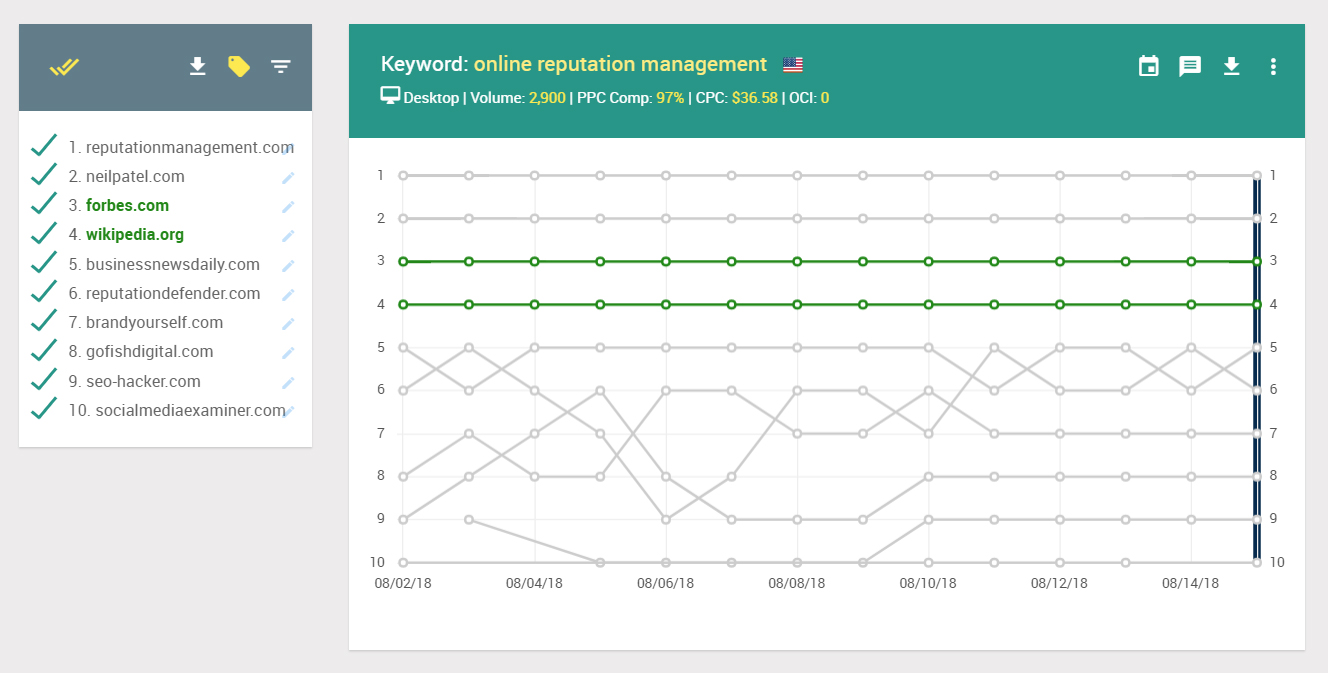
Imagine a client then decides to search your company’s name and finds all sorts of negative reviews, unfair comparison articles, and who knows what else? Even a couple, even just one, that could be enough to send them looking elsewhere. How can they take you seriously to fix their reputations when your own house isn’t in order?
If this sounds like common sense that’s because it is, but you would be surprised how often you’ll see people slipping up like this.
Reporting to your Clients
Being able to plug your client’s name into SERPWoo to see where they stand with a color-coded guide makes it easier for you to price these jobs. You may see a client who already has nearly all favorable results, with just a small blemish here and there. In that case, you can pitch them on preventative ORM. Alternatively, you might see a client whose SERPs are an absolute disaster, and you’ll know you’ve got your work cut out for you.
You can report results to your clients using SERPWoo’s dead-simple PDF report feature.

Using SERPWoo for ORM
This is the SERPWoo blog after all, so let’s get into some more specific details on how SERPWoo can help make this process a lot simpler, including features designed specifically for agencies who service clients.

We’ve discussed this in bits and pieces throughout the post, now let’s get it all in one place.
We know of many agencies using SERPWoo to carry the weight of all sorts of daily, weekly, and monthly tasks. We also see some agencies that aren’t taking full advantage of SERPWoo’s tools to offer a complete ORM solution to their clients, so if you’re at an agency, this is some food for thought.
It likely fits in well with a lot of the work you’re already doing, and it’s an easy upsell for any client that has negative results showing up in the SERPs already, but even the ones who don’t have anything bad showing up yet.
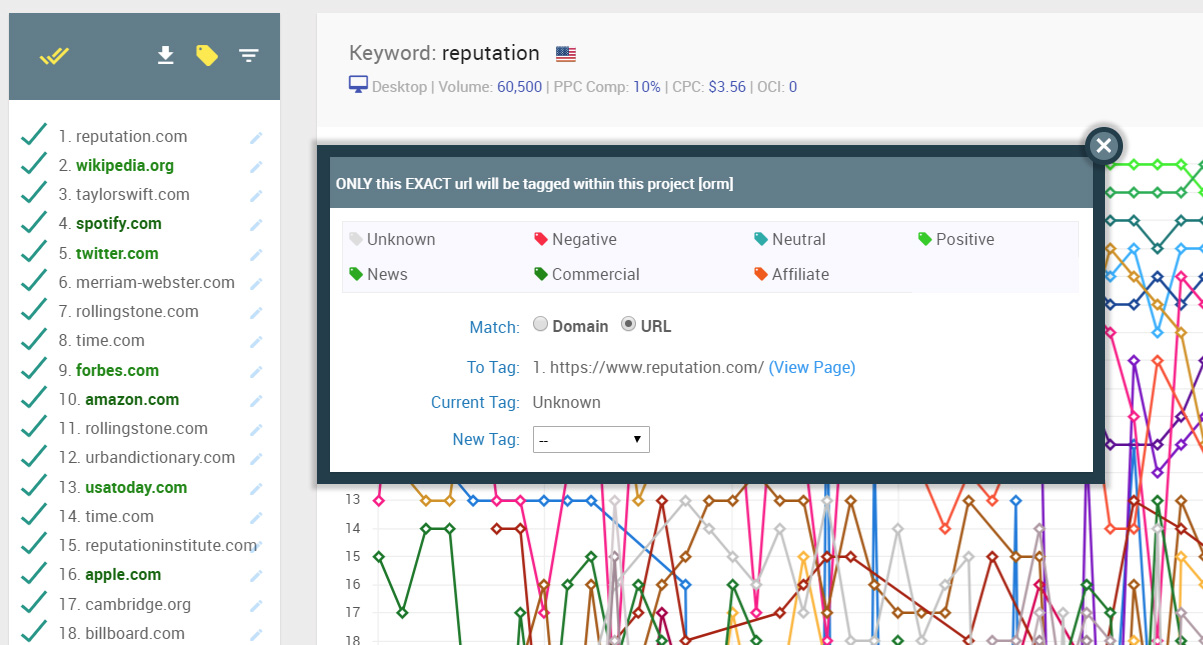
SERPWoo isn’t going to go out and create new profiles for you, or publish a flattering article about you on Business Insider, but SERPWoo IS going to help you study the SERPs and track all of the above and it’s going to make it really easy to relay all of the vital information to your clients without spending more than a moment or two on preparing reports.
In a typical SERP, like the results for a product review you’re trying to rank, maybe one or two of the properties will be under your control. It’s useful to see your movements compared to your competition using SERPWoo’s charts.
This feature gets put into overdrive when it comes to ORM, where you’re trying to control as many of those spots as possible. After you’ve created your new profiles, gotten some articles and blog posts out in the wild, and everything else we’ve talked about... having a visual overview of the entire SERP becomes so incredibly useful in tracking the results.

Having a historical overview of the entire SERP’s movements including being able to tag things as good or bad gives you a great indication of which direction your search results are heading, and most importantly it makes it simple for your clients to understand the progress you’re making at a quick glance.
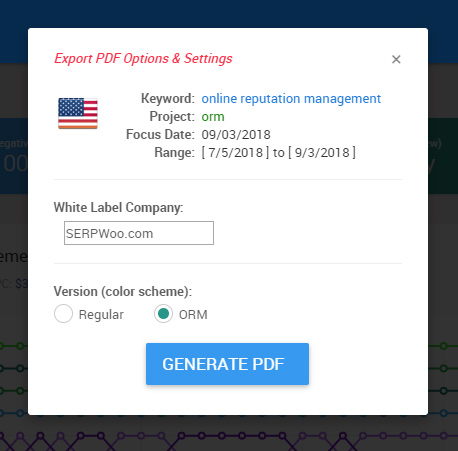
You can easily change which tags are used, with choices ranging from negative, neutral, and positive like we’ve been discussing throughout this guide.
There are also options for things like news, commercial, and affiliate pages to really help you get a clear picture of what’s going on and what’s sticking so that you can adapt accordingly.
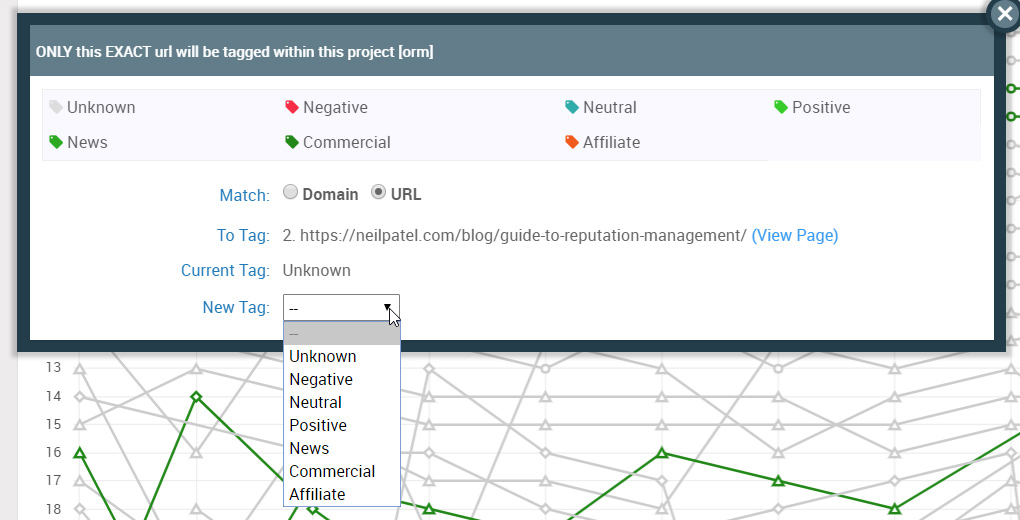
If you notice negative results on certain domains, you’ll want to investigate whether you’re able to submit your own content onto those domains. Sometimes, with enough elbow grease, you can have your positive result on that domain outweigh and replace the negative one.
CONCLUSION
At the end of the day, if you want there to be an abundance of positive things showing up about you, your brand, or your clients... it helps to be doing positive things, treating your customers right, forming strong relationships, and acting with integrity.
While there is an element of made-up nonsense that people are going to spew to maliciously damage you, there’s also cases where you’ll deserve the negative feedback, so actively trying to avoid those types of situations is one of the best things you can do to prevent these types of listings from appearing in the first place.
There’s always going to be miserable people who are fueled by stirring up as much negativity as they can, and competitors who will stop at nothing to take a dollar out of your pocket and who live in countries where you can’t really do a whole lot about it legally, but you still have a lot of control over what shows up when people search for your name.

Working to create positive content and then to signal boost it will create a strong foundation to protect your SERPs and to keep them looking in tip-top shape for anyone who may decide to look you up.
Want to get a downloadable cheatsheet of steps you should take to shape up your (or your client's) online reputation management? Just click here.
